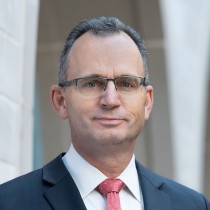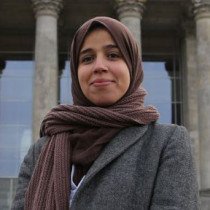Contents:
- Will new members alter the strategic direction of BRICS?
- Negotiating with Sudan’s warring generals won’t bring sustainable peace
- Varied responses to Niger crisis highlight Sahel’s changing power dynamics
- Turkey pushes Russia, West to reinstate Ukraine grain export deal
- Fuel crisis in the making in Iran
- What World Water Week and water innovation mean for the MENA region
Will new members alter the strategic direction of BRICS?
Gerald M. Feierstein
Distinguished Sr. Fellow on U.S. Diplomacy; Director, Arabian Peninsula Affairs

-
With the addition of six new members, four from the Middle East, to the BRICS organization, the group potentially has added geostrategic significance; but it remains to be seen whether BRICS can be the counterbalance to the West that Russia and China seek.
-
The new members actually may add to the group’s historic lack of internal cohesion, while Russia’s and China’s own difficult issues — faltering economies and the burden of the Ukraine conflict — could bring down BRICS+6 as well.
With the addition of six new members, including four from the Middle East — Saudi Arabia, Egypt, the United Arab Emirates, and Iran — along with Ethiopia and Argentina, the BRICS (Brazil, Russia, India, China, and South Africa) grouping has significantly expanded its political, economic, and geostrategic presence. The Chinese, who were particularly invested in expansion, view the invitation to the six as historic. In Chinese President Xi Jinping’s characterization, the expansion “shows the determination of BRICS countries for unity and cooperation with the broader developing countries.”
Nevertheless, for an organization that often has appeared to be falling short of expectations, it remains to be seen whether the expansion will bring greater coherence or relevance to its efforts. For two of the traditional members of the group — China and Russia — a principal objective for BRICS has been to serve as a counterbalance to the perceived unipolar international system dominated by the United States and its Western allies. In his address to the summit, delivered remotely because of his International Criminal Court (ICC) indictment for war crimes, Russian President Vladimir Putin claimed that BRICS expansion would challenge U.S. domination and help build “a multipolar world order.” With the exception of Iran, however, none of the new members is likely to share that objective entirely. Saudi Arabia and the UAE have pursued more independent foreign policy goals and objectives in recent years, but neither has demonstrated any interest in eschewing their ties to the West, and they continue to build on long-standing security cooperation. Egypt is also closely tethered to the U.S. security umbrella, and its budding economic ties to Russia cannot provide an alternative for its links to Western economies and financial institutions.
Moreover, the choice of the six new members could bring into the organization new challenges to its internal cohesion. In addition to the long-standing friction between China and India, the organization might now confront fallout from Iranian-Saudi differences as well as strains between Egypt and Ethiopia over sharing the Nile waters and the construction of the Grand Ethiopian Renaissance Dam (GERD). Whether BRICS+6 can provide a framework for mediating those issues, as China’s engagement with Iran and Saudi Arabia facilitated their improved relations, remains an open question. Brazilian President Lula da Silva cited the Ukraine war as evidence, in his view, that the United Nations Security Council had proved not fit for purpose. Can BRICS succeed where the U.N. has failed?
Finally, while Russia and China have long been seen as the driving forces behind the BRICS group, the now-expanded organization might soon face questions about their continued capacity to lead. For the past two decades, China’s international influence has been linked to its strong economic performance. With questions presently being raised about whether its economic model is sustainable, will its geopolitical influence diminish as well? Similarly, with its economy in tatters and its aggression in Ukraine continuing to tarnish its image, will Russia’s efforts to expand its global reach continue or fall victim as well to Putin’s grandiose designs? If China and Russia falter, is BRICS+6 another organization that is destined to join the Non-Aligned Movement as an idea that has come and gone without leaving much of a trace? The jury is out.
Negotiating with Sudan’s warring generals won’t bring sustainable peace
Paul Salem
President and CEO

-
The Sudanese civil war, ignited by Generals Burhan and Hemedti, has already killed and wounded several thousand people, displaced hundreds of thousands more, and is generating a multilayered humanitarian crisis.
-
While regional capitals will be content to talk only to generals, the international community should reengage with the very civilian forces that forced positive change in 2019 and are the foundation for any lasting stability and development in the Sudan.
Even before fighting broke out in mid-April between rival military factions in Sudan, almost a third of the country’s population needed humanitarian aid and 3.5 million were displaced. Since then, the ongoing conflict has killed and wounded several thousand people, displaced hundreds of thousands more, and is generating a multilayered humanitarian crisis, which Martin Griffiths, the United Nations’ under-secretary-general for humanitarian affairs, described as being of “epic proportions.” The Sudanese civil war risks becoming the fourth chronic civil war in the Middle East and North Africa — joining those of Libya, Yemen, and Syria — spreading more refugees and instability, and mirroring the debilitating pattern of failing states, foreign influence, and proxy conflict that has been unfolding in the neighboring Sahel region.
The two generals devastating Sudan in a fight for dominance — Abdel Fattah al-Burhan, the head of the Sudanese Armed Forces (SAF), and Mohamed Hamdan Dagalo (known as Hemedti), leading the paramilitary Rapid Support Forces (RSF) — came together in 2019, in a pantomimed response to public protests, to topple the regime of then-President Omar Bashir. In 2021, Burhan and Hemedti joined forces again to topple the civilian government and abort negotiations and any further partnership with the civilian protest movement. Having cleared the path for military rule, it was inevitable that the two generals would face each other in the “finals.”
The U.N., United States, United Kingdom, African Union, Saudi Arabia, and the United Arab Emirates have all attempted mediation efforts to bring about a ceasefire and a negotiated end to the conflict. But two generals do not a political system make, and negotiating with the pair of warlords who caused the crisis in the first place will not bring sustainable peace. Indeed, Sudan cannot return to a path of regaining stability and resuming development until there is progress toward reviving the civilian and democratic transition.
Hemedti on Sunday floated a raft of reform ideas to remake the Sudanese state and army, and Burhan is set to travel to Egypt and Saudi Arabia with proposals of his own. While regional capitals will be content to talk only to generals, this approach will not bring about any lasting solution. Both regional capitals and the international community should reengage with the very civilian forces that forced positive change in 2019 and are the foundation for any lasting stability and development in the Sudan.
Follow on Twitter: @paul_salem
Varied responses to Niger crisis highlight Sahel’s changing power dynamics
Kamissa Camara
Non-Resident Scholar

-
Niger had sought to maintain a careful balancing act between its relationships with France and the United States, but the coup illuminated surprising discord between Paris and Washington.
-
While the fate of President Bazoum remains uncertain, the Niger crisis underscores the contrasting strategies of Western and African partners.
The unexpected coup in Niger on July 26 marked a significant twist in the region’s political landscape. While neighboring countries like Mali, Burkina Faso, Guinea, and Chad have all experienced military takeovers since 2020, Niger had been perceived as a bastion of stability, making it a key ally for Western states combating terrorism in the Sahel. However, the recent coup revealed an unforeseen divergence between American and French strategies in response to the crisis, unsettling previously assumed power dynamics.
Niger had sought to maintain a careful balancing act between its relationships with France and the United States, but the coup illuminated a surprising discord between Paris and Washington. The French approach, once dominant, seems less influential. In contrast, the U.S. chose a path of its own that contradicts French policies. This divergence is striking in a region where France’s sphere of influence is rapidly diminishing.
President Mohamed Bazoum took office in April 2021 through the first democratic transfer of power in Niger’s history, and the sudden coup in July 2023 led to swift calls from France and the Economic Community of West African States (ECOWAS) for his reinstatement. Yet the United States adopted a measured stance by refraining from labeling it a “coup.” This move likely aimed to facilitate diplomatic negotiations and maintain communication with the junta leaders, given the substantial U.S. military presence in Niger.
While France supported the ECOWAS’ threat of a military intervention in Niger to restore President Bazoum, the United States rejected such a notion. Instead, it pursued its own diplomatic strategy by sending Acting Deputy Secretary of State Victoria Nuland to meet with the junta leaders. This independent move was reinforced by the appointment of a new U.S. ambassador to Niger, in sharp contrast to France's refusal to accept the junta’s declaration of the French ambassador as persona non grata.
Amid these differing Western approaches, the reactions of African partners varied as well. Algeria, a key investor in regional development in the Sahel, opposed military intervention to prevent a proxy war to its south. In contrast, Morocco remained silent, continuing its South-South cooperation regardless of internal political developments in Sahel nations.
While the fate of President Bazoum remains uncertain, the Niger crisis underscores the contrasting strategies of Western and African partners. These varied approaches reveal profoundly evolving power dynamics in the Sahel and the complexities of safeguarding diplomatic relationships and security interests in the face of changing geopolitical realities.
Follow on Twitter: @KamissaCamara
Turkey pushes Russia, West to reinstate Ukraine grain export deal
Gönül Tol
Director of Turkey Program and Senior Fellow, Black Sea Program

-
Resuming the grain deal is important for Ankara not only because it created trade opportunities among Russia, Ukraine, and Turkey, but also for boosting Turkey’s international image as a mediator and its clout among non-Western countries dependent on wheat imports from the Black Sea region.
-
The West and Ukraine are looking for alternative ways to export Ukrainian grain, but none can obtain Russian consent needed to restore “calm” in the Black Sea, and thus, none are desirable from Turkey’s point of view.
Turkey’s Foreign Minister Hakan Fidan met with Ukrainian President Volodymyr Zelenskyy in Kyiv last week as Ankara tries to revive the Black Sea grain export deal. The agreement, which was brokered by the United Nations and Turkey last year, ended in July, after Russia withdrew, citing ongoing restrictions on its own fertilizer and agricultural goods. In an effort to persuade Russian President Vladimir Putin to return to the deal, Turkey’s Recep Tayyip Erdoğan is planning to meet with his Kremlin counterpart “soon.”
Resuming the grain deal is important for Ankara. It not only created trade opportunities among Russia, Ukraine, and Turkey, but it also boosted Turkey’s international image as a mediator and its clout among non-Western countries that are dependent on wheat imports from the Black Sea region. The collapse of that inherently precarious arrangement, however, has created complications for Turkey that go well beyond the above-mentioned considerations. Since Moscow’s exit from the agreement, Russian forces have launched attacks on Ukrainian ports with missiles and drones, while Ukraine has carried out attacks on vessels off Russia’s coast, prompting concerns that commercial shipping could become riskier across the entire sea. In a further escalation of tension in the region, the Russian navy fired a warning shot and boarded a Turkish-owned cargo vessel headed to the Ukrainian port of Izmail — the main export route for Ukraine’s agricultural products — to conduct an inspection.
The dramatic escalation has turned the Black Sea into a major hotspot in the 18-month battle between Russia and Ukraine, something Turkey has sought to avoid and that makes Ankara’s efforts to walk a fine line between the warring parties a lot more difficult. Turkey has long opposed efforts to expand the North Atlantic Treaty Organization’s (NATO) presence in the region so as not to provoke Russia. If Moscow does not agree to resume the grain deal and continues to target Ukrainian ports and seizes vessels, NATO might be forced to intervene more forcefully to secure a humanitarian corridor for shipping. That will put Turkey in a difficult spot, which is why it is pushing hard to convince Russia to rejoin the deal and denying reports that an alternative to the original deal is in the works.
The West and Ukraine are looking for alternative ways to export Ukrainian grain, however. Several options are on the table, including to press ahead with maritime exports regardless of Russia’s position or to transport the Ukrainian grain via the Danube River. But none of these choices can secure Russian consent needed to restore “calm” in the Black Sea, and thus none of them are desirable from Ankara’s point of view.
Resuming the original grain export deal requires convincing both Russia and the West to make concessions. Little is publicly known about the specifics of the discussions. But Russia wants the West to meet its demands to dispatch its own grain and fertilizer abroad and to reconnect the Russian agricultural bank Rosselkhozbank to the SWIFT international payment network, which was cut off by the European Union in 2022 over Russia’s full-scale invasion of Ukraine. The EU initially opposed reinstating Russian banks but later announced it might consider connecting a subsidiary of Rosselkhozbank to SWIFT “to allow specifically for grain and fertilizer transactions.” The forthcoming meeting between Erdoğan and Putin holds the key to the fate of the grain deal, which will have much wider strategic implications for both Turkey and NATO.
Follow on Twitter: @gonultol
Fuel crisis in the making in Iran
Nikolay Kozhanov
Non-Resident Scholar

-
With its quickly growing rates of gasoline consumption, Iran could once again become a sustained net importer of automotive fuel, marking the end of more than a decade of proclaimed self-sufficiency and potentially further heightening its reliance on Russia.
-
Tehran has almost run out of options for solving the fuel crisis as it struggles to maintain production capacity while being unwilling to take unpopular measures to reduce skyrocketing domestic demand.
The last couple weeks of August have been marked by news of long lines forming at Iranian gas stations and attempts by the country’s leadership to reassure the population that there is no gasoline supply crisis. In part, the current situation is, indeed, caused by panic rather than by the real absence of gasoline on the market. It was ignited by rumors about a coming increase in fuel prices, a possible reduction in the amount of discounted gasoline the population can buy on a monthly basis, and potential limitations on gasoline purchases without using personal fuel cards. Worried about the growing public concerns, the government hastened to reassure Iranians that it was not trying to regulate fuel sales but only planned to improve their accounting. Meanwhile, some evidence suggests that the Iranian leadership was in fact planning some new regulatory moves but canceled them at the last minute to avoid public unrest.
Still, the current situation is a harbinger of a major looming crisis. The Iranian authorities are forced to admit they are failing to maintain a balance between demand and supply on the domestic gasoline market. In summer 2023, growth rates of fuel consumption are estimated at 13% year on year . Consequently, since the start of summer, Iran’s average daily demand stood at 120 million liters, with occasional peaks of 127 million liters a day. Meanwhile, the production rates topped out at 115 million-117 million liters a day. Apparently, the Iranian leadership has already had to release fuel from its reserves to meet record daily consumption.
At the same time, it would be wrong to blame the “oil bloc” inside the government for the coming crisis. In charge of boosting the supply side, these officials and administrators are trying their best. In just the last 12 months, gasoline production in Iran increased by 20 million liters per day (from 98.5 million in 2022); but at present, Iran’s industry is operating at the limit of its capacity. Therefore, the government also adopted a program to strategically increase fuel production over the coming years. However, the key cause of the current crisis is spiking demand spurred on, first of all, by subsidized low prices for gasoline (3-6 cents per liter), which, in 2022, cost Iran’s budget about $36 billion.
Under these circumstances, a cut to the subsidies is the obvious solution, yet the country’s leadership will hardly be able to do this. Past experience clearly shows that each previous increase in retail fuel prices inevitably led to a new wave of protests. A similarly sharp rise in gasoline prices generated some of the biggest protests in November 2019. These were put down with great brutality and put the Iranian elite off from any attempt to revise the current subsidy system. Moreover, with today’s ongoing instability, increasing fuel prices would be like trying to put out a fire with gasoline.
Under these circumstances, if the country’s refining sector does not achieve another production breakthrough, Iran will have no choice but to look to willing external suppliers, whose number is quite limited. In the end, this might push Iran closer to Russia as the most convenient available source. Perhaps it is telling that despite denials by Iranian officials, Moscow claims it has already started occasional exports of gasoline to Tehran.
Follow on Twitter: @KozhanovNikolay
What World Water Week and water innovation mean for the MENA region
Malak Altaeb
Non-Resident Scholar

-
World Water Week showed how collaboration between different sectors and stakeholders can support the implementation of innovative water projects and initiatives; moreover, it highlighted the key role of financial institutions in helping to improve water resource management.
-
Events like World Water Week 2023 are instrumental in shaping the global agenda on water management, climate resilience, and sustainable development.
World Water Week, which took place this past week in Stockholm, Sweden, aimed to facilitate the exchange of knowledge, experience, and best practices among various stakeholders in the global water community. The event, hosted by the Stockholm International Water Institute from Aug. 20-24, was designed to raise awareness about the urgent need for internationally coordinated, sustainable water resource management and sanitation services. World Water Week brought together government officials, business leaders, academics, non-governmental organizations, and representatives from the United Nations to discuss and develop interdisciplinary water solutions.
This year’s theme, “Seeds of Change: Innovative Solutions for a Water-Wise World,” focused on innovation in finance, research, technology, diplomacy, and governance. The conference aimed to produce actionable insights and commitments from stakeholders that will aid in solving the global water crisis and ensuring a sustainable and resilient future for all. In addition, the event put a particular emphasis on the inclusion of youth, both as online and on-site rapporteurs to report on diverse sessions and interview critical stakeholders, and as representatives to share solutions and valuable insights.
For the Middle East and North Africa region, one session addressed the challenges of implementing water governance and strengthening water, sanitation, and hygiene (WASH) systems. One of the speakers, Shahira Wahbi of the League of Arab States, stated that, “In the MENA region, we have to have a financial system for water, particularly WASH systems.” She highlighted the importance of establishing coordination capacities and putting them into action, alongside effective monitoring capabilities to track where things stand. “Above all, we must prioritize WASH as it competes with other sectors and priorities,” she added.
World Water Week showed how the collaboration between different sectors and stakeholders can support the implementation of innovative water projects and initiatives. Most importantly, it highlighted the key role of financial institutions in helping to improve water resource management. In addition, it also underscored how governments across the MENA region must prioritize water transformation, given the high level of scarcity and mismanagement.
Providing government incentives would help pave the way for the private sector to get more involved and take action to improve water services and sanitation. The ethical question around water pricing is a vital one for the region, but it is important to enable people to differentiate between pricing for the service and not water itself. Thus, governments should consider opening a dialogue with communities around the region so that they understand the difference, which will facilitate private sector engagement.
Events like World Water Week 2023 are instrumental in shaping the global agenda on water management, climate resilience, and sustainable development. For the water-scarce MENA region and other areas facing similar challenges, the insights and outcomes generated could prove to be invaluable. Events such as these provide a critical opportunity to move beyond discussion, converting knowledge and ideas into actionable insights and commitments.
Follow on Twitter: @MalakLibya1
Photo by Xie Huanchi/Xinhua via Getty Images
The Middle East Institute (MEI) is an independent, non-partisan, non-for-profit, educational organization. It does not engage in advocacy and its scholars’ opinions are their own. MEI welcomes financial donations, but retains sole editorial control over its work and its publications reflect only the authors’ views. For a listing of MEI donors, please click here.













